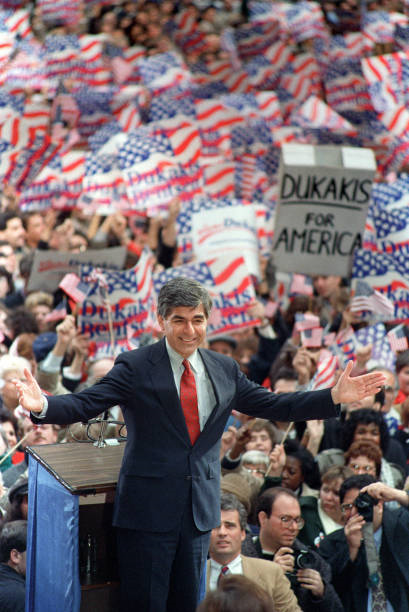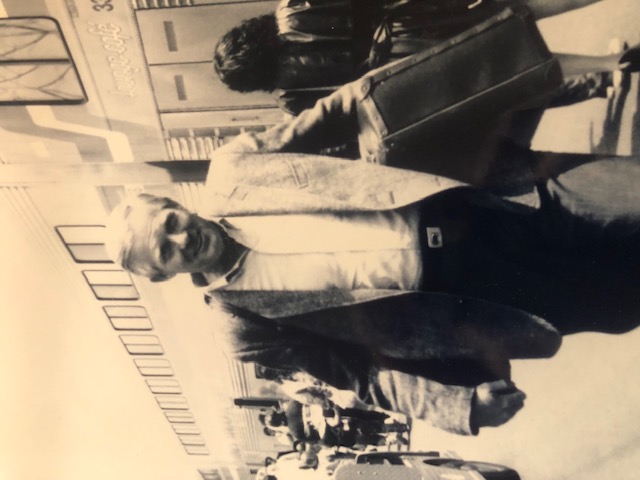
“Well Richard, they wouldn’t let you join the circus (U.S. Senate) so you went out and created your own,” said a party leader and major Vote Smart contributor.
Or, as a less supportive columnist wrote, “How wonderful the idea of Vote Smart is, what a great national need it would fill if only it was not being led by this idiot.”
So, it would go for the next 30+ years.
Good Morning America was a lesson learned. The national media did not see us as a story. If we wanted people to know what we did, how we did it and why, we would have to do it ourselves. Convincing right-wing conservatives and left-wing liberals, or even middle of the roaders, all distrusting and cynical of any political organization, to support us, would be tough. A bit like convincing Barney Flintstone that his progeny could and would eventually build wings and fly to the moon one day.
In the beginning I had been sure that there must be, had to be, could not help but be, people more qualified, more knowledgeable, more able than I to do this thing I was doing. As it turned out, the one essential quality required, a willingness to step up to the plate, was limited to three: Lorena, Adelaide and myself.
We were all excited. And if we were going to ever cover state offices and handle the incoming demand from voters, we were going to need more space, a lot more space and a lot more interns. Oregon State was able to double our space, but it would not be enough. Michael Dukakis, a former Massachusetts Governor, Democratic nominee for President losing to Ronald Reagan, and fellow Project Vote Smart board member, had a solution.
I got to Boston to meet Governor Dukakis, who was teaching at Northeastern University. Although he had joined our board, I had never met him and was anxious to do so. I had not been involved in his campaigns but would regret that almost as soon as I met him and for a quirky reason difficult to convey.
Americans are not warm to the most ethical and honorable, nor are they given any opportunity to see through the political fog of campaigns to recognize these attributes when they exist.
I met Governor Dukakis at a Boston subway stop and we walked together the half-dozen blocks to meet with some Northeastern University officials about a potential Vote Smart office there.
Now I am an ambler, you would think I never had anywhere to go and certainly did not want to get there if I did. This was not so with the Governor. We shook hands, said no more than a sentence or two of standard greeting and then as if he heard a starter’s gun, inaudible to anyone else, he was off like a shot. Though my legs were twice as long, I had difficulty keeping up with his stride. As I loped alongside, we, he mostly, talked of politics, his passion instantly evident. He was partisan in that thoughtful, knowledgeable, convincing manner that is well peppered with a conviction you are reluctant to challenge and be proven foolish. I was listening in envy as much as awe to this man devout to his cause when I noticed something. Something he had been doing all along, but I was only now picking up on. As we coasted down the sidewalks, he had been doing this thing so inconspicuously, so unpretentiously, so unobtrusive to our conversation that had he not found it necessary to do it repetitiously I would never have noticed. But there he was picking up trash as he flew, not a cup, wrapper or scrap of paper missed his grasp, or any trash receptacle as we sliced through the students on their way to class.
Who does that? Who picks up other people’s trash? It was not what he did as much as how he did it that earned both my admiration and my duplication to this very day. Liberal or Conservative, t’is no matter, it is those like that, willing to stoop and pick up after you that should be our leaders.
We met with all the university mucket mucks about the possibility of opening a second office at Boston’s Northeastern University. It became instantly clear that Oregon State’s angelic location in lily-white waspy Corvallis was set on remaining lily-white, while Northeastern not only welcomed minorities but fought to attract them. It was the difference between intellectuals that talk the talk and those that walk the walk.
We sent Angela Twitchell, the young woman we found two years earlier clerking in a sporting goods store to run the show in our new Boston office. She quickly shamed my efforts in Corvallis. Hiring a crack crew just wetting their post-college feet, she easily organized the kind of office I struggled mightily to find just half as much success doing. Spirited, ambitious and smart, Northeastern took on some of our biggest problems, most importantly the testing of candidates in what we called our National Political Awareness Test, another ditzy name I forced on everyone that had no relationship to the actual test itself. It tested a candidate’s willingness to actually answer voters’ questions, with the byproduct of saying what they would do for you or to you on major issues if elected. To run it she selected a bright new doctoral student named Kyle Dell, a top-notch political scientist that we would one day ask to join our Founding Board.
Her office so rarely had problems that I began to wonder as to the necessity of me. Although I would visit the office now and then, I only had to visit it once to fire someone, the only hiring error she ever made. He was afflicted with a little booger on the brain. He fancied himself as a man of the future as long as that future degraded Jews. I imagined his firing a great pleasure, so I insisted on doing it myself. It wasn’t a pleasure. Crushing anyone is not fun particularly a young person, not even when dealing with an ignorant antisemitic.
We paid subsistence wages, just enough to cover cheap rent and eat or about $1000 less than wages at McDonalds. For the privilege of working at Vote Smart, staff was expected to cover seven-days a week. The only holidays I recognized were Christmas, Thanksgiving, and New Year’s.
We wanted to be dependable and available, which in those early years could never be done in a 40-hour work week. In addition, at least during the last months of an election year you might be expected to work nights too. We were open 24 hours a day.
My demands on staff, students and volunteers would lighten, by necessity, in years to come, but in the early years I expected everyone to devote their lives to Vote Smart. We were at war, and they better know it, act like it, and fight like their lives depended upon its success. If they didn’t, they were gone.
I lived Vote Smart every waking hour and a great many that were not. Having invested my savings, home, retirement, and soon inheritance in the Project, and refusing my salary for five years, I became as poor as anyone can be—and I loved it. It was the quest, I was going to save a nation, make my life worth the living of it, and force anyone I could to do the same. Who can have a life better than that?
There were a staggering number of people who needed no impressment, who on their own motion strode through our doors asking if they could help. Over the years there would be thousands signing up for the minimum 120 hours of commitment required of interns, and volunteers signing on for 300 hours or more, all receiving nothing but a handshake in payment. They would be as young as 14 and as old as 93, some poor, some wealthy. Doctors, lawyers, teachers, a hundred other professions; every color, gender, and state were represented a hundred times over—even two dozen foreign nations sent students to help and learn how to build what we were attempting to build.
I was relieved but not surprised by the assortment and numbers of people willing to chip in and build Vote Smart. I often peered through a door or window at them slaving away and wondered: If I had had a different life, stayed a teacher, been a labor leader, a surgeon, bank president, or spent a life as a butcher, baker or candlestick maker, would I be sitting there stuffing envelopes, proofreading endless pages of data, straining eight hours a day over a computer screen? I was doubtful, but there they were.
In one memorable week the Launch Director for NASA’s Apollo Program, Patti Hearst (not the gunslinger but the matriarch) in a diamond necklace and Tom Gugglin, a sick former teacher and Korean War Vet we found trying to make a home on a piece of carpet in the dumpster behind our office sat there stuffing envelopes together. Everyone doing whatever it took, whatever needed to be done, to get this idea off the ground.
Who could not make a grand success with such interest, such support, who could fail with so great a resource as that?
The work at Vote Smart was monotonous, redundant, repetitive Hell. Every job at Vote Smart was interesting for a day, maybe two, but political research on thousands of candidates quickly degenerates into dementia-inducing boredom. When that happens, mistakes are made and Project Vote Smart was not going to make any mistakes.
The data Project Vote Smart provided would be as dependably useful as the morning sun. I would say to the staff, “Remember when you enter data on an elected official or candidate, their reputation is in your hands and so is Vote Smart’s.” NO ERRORS was the mantra. Each series of voting records, issue positions, ratings, and biographical records had to be proofed and signed by each person doing the initial data entry. Then their work would go to a supervisor where they would sneak in six intentional errors. The work would then go to three other proofreaders, each having to proof it until they found all six errors and no others. If a seventh error was found we started again from scratch. “NO ERRORS!”
The work was numbing and the pressure for accuracy intense. Sometimes in the early days the pressure was released in a number of loud, not always pleasant arguments, always about politics. Understandably, people who were committed to such tasks simply assumed that the people next to them were good people too and saw things the right way just as they did. Not so! You did not know if you were sitting next to a right winger, left winger, or someone just completely out in orbit. So, we hung large signs with big black lettering at each office entrance:
CHECK YOUR POLITICS
AT THE DOOR!
(New chapters will be added roughly once a week)
Richard Kimball, Vote Smart Founder
Sign up on my Blog at: richardkimball.org
or
Medium.com at: https://medium.com/@daffieduck2016
